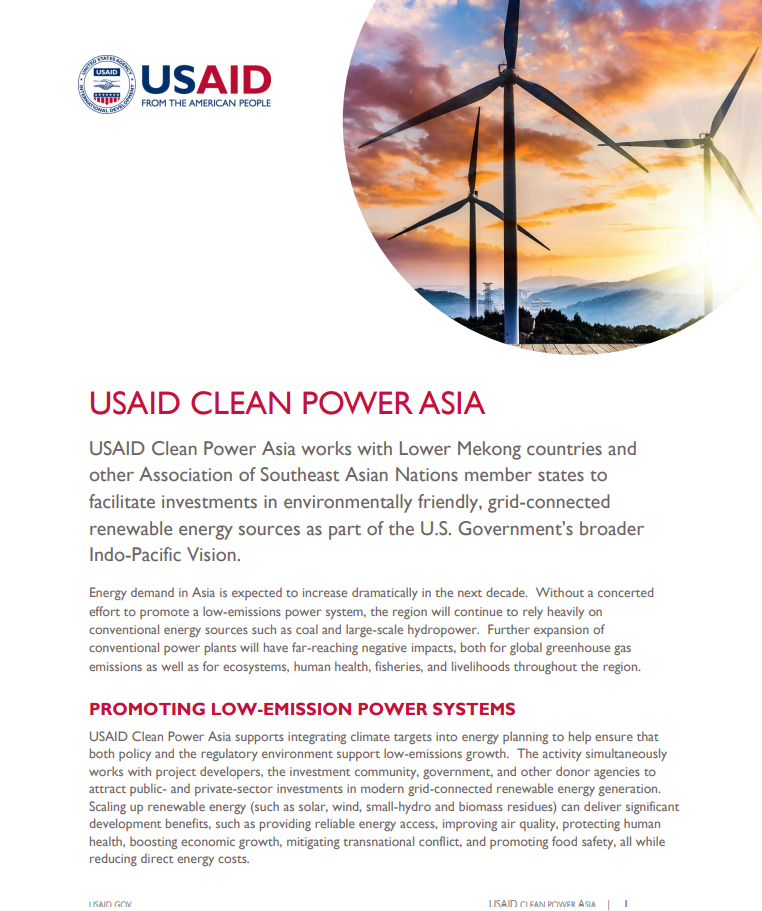Speeches Shim
USAID Clean Power Asia Fact Sheet ![]() (pdf - 252k)
(pdf - 252k)
USAID Clean Power Asia works with Lower Mekong countries and other Association of Southeast Asian Nations member states to facilitate investments in environmentally friendly, grid-connected renewable energy sources as part of the U.S. Government’s broader Indo-Pacific Vision.
Energy demand in Asia is expected to increase dramatically in the next decade. Without a concerted effort to promote a low-emissions power system, the region will continue to rely heavily on conventional energy sources such as coal and large-scale hydropower. Further expansion of conventional power plants will have far-reaching negative impacts, both for global greenhouse gas emissions as well as for ecosystems, human health, fisheries, and livelihoods throughout the region.
PROMOTING LOW-EMISSION POWER SYSTEMS
USAID Clean Power Asia supports integrating climate targets into energy planning to help ensure that both policy and the regulatory environment support low-emissions growth. The activity simultaneously works with project developers, the investment community, government, and other donor agencies to attract public- and private-sector investments in modern grid-connected renewable energy generation. Scaling up renewable energy (such as solar, wind, small-hydro and biomass residues) can deliver significant development benefits, such as providing reliable energy access, improving air quality, protecting human health, boosting economic growth, mitigating transnational conflict, and promoting food safety, all while reducing direct energy costs.
IMPROVING POWER SECTOR PLANNING
USAID Clean Power Asia works to establish and update evidence-based renewable energy targets and integrate these targets into national power development plans and power sector resource plans. USAID also helps countries to plan for and develop renewable energy zones that synchronize the critical power generation and transmission planning processes. Renewable energy zones create greater opportunities for private sector clean energy companies and reduce the overall costs of grid-connected renewable energy.
FOSTERING SUPPORTIVE POLICY FRAMEWORKS
USAID Clean Power Asia supports Lower Mekong countries become more receptive towards grid-connected renewable energy development by analyzing barriers and policy impacts; facilitating the exchange of lessons learned and best practices; conducting stakeholder consultations; and developing pilot programs. USAID provides technical leadership in distributed photovoltaics, solar farms, and resource complementarity to help partners develop and improve clean energy policies, incentives, regulations, and standards.
MOBILIZING FINANCE AND INVESTMENT
In the Lower Mekong region, renewable energy projects receive less interest than traditional capital investments, and financial institutions face barriers to effectively engaging and investing in renewable energy. USAID helps to secure and reduce the cost of finance for clean energy projects by helping to develop innovative business models; promoting standardized documentation, evaluation practices, and approval processes for financing renewable energy projects; and providing customized advisory services.
IMPACT AND RESULTS
USAID Clean Power Asia aims to mobilize at least $750 million in clean energy investments over five years; install at least 500 megawatts of grid-tied renewable energy generation; and implement new laws, policies, strategies, plans, and regulations to reduce greenhouse gas emissions. To date, USAID Clean Power Asia helped Thailand B. Grimm Power and Vietnam solar developer TTVN to close a $283 million deal to construct one of Vietnam’s first solar farms designed to generate 257 MW—enough energy to power more than 50,000 homes. In Thailand, USAID Clean Power Asia worked with six Thai Union factories to procure and install 7.6 MW of rooftop solar projects valued at more than $10 million. USAID Clean Power Asia also helped retail giant Big C Thailand close a $4.8 million deal to launch a 3.6 MW solar rooftop program.


Comment
Make a general inquiry or suggest an improvement.